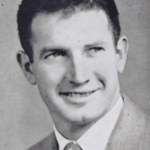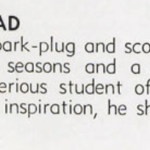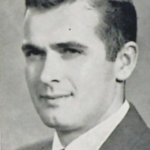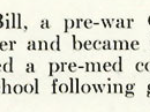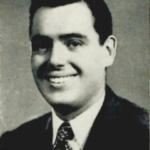
The 1950 Pine Hill Village Christmas Party (Algol)
Below, our page contains recorded audio files of interviews conducted, along with highlighted topics and quotes. Additionally, we’ve provided individual biographies and photos of individuals and Pine Hill Village where applicable.
Contents
Pine Hill Residents
Jack Thurnblad ’49
The Goode Family: David Goode ’49 and Nancy Goode
Non-Residents
Robert (Bob) Will ’50
Sue Lebeck Adamek ‘54
Bill Phillips ’48
Ann Buran ’54
Ken Wedding
Jack Thurnblad ’49
Jack Thurnblad is the men’s athletic director and basketball coach. He was a chief petty officer in Navy during WWII. He majored in history. Met his wife, Virginia Thurnblad (’48 Sociology) at Carleton at a dance and lived at Pine Hill Village for his last two years at Carleton.
- Taken from 1949 Algol.
The Transition From the Navy to College and Family Life
“It wasn’t a difficult transition [from Navy to college life] because you know it was something that the times demanded all of us to do…you had to be adjustable and to adjust to the time and the place you were.” [00:13:33]-[00:13:51]
“It wasn’t difficult [to balance school and family life]. It seemed to just come naturally. I don’t think it was difficult at all.” [00:07:55]-[00:08:05]
Comparing Dorm and Village Life
“I would say we lived in a normal college style. You know, we had all the games and the class. It really didn’t seem a lot different than living in the dorm.” [00:03:16]-[00:03:41]
“…it was a different setting, but we all had a lot in common and we were still on the campus. It was easy to adjust to living there.” [00:02:31]-[00:03:04]
Social Life

Taken from 1949 Algol.
“[My wife and I] went to the dances and went to all the games that were going on, basketball games or football games or the baseball games. We even partied with the other people who lived in the village…they were just normal get togethers except we all had a lot in common. We were all living in the same place, going to the same school, having the same professors, doing many of the same activities, so we talked about all those things, the games and our teams and our friends.” Usually only Pine Hill residents were invited to these gatherings. [00:08:46]-[00:10:13
Community
“We had a lot in common, we were all young married couples enjoying our college life.” [00:01:23]-[00:01:32]
“My favorite memory of the village is the friendships we made and the experiences that we enjoyed together by being in the same place and living together. Those are basically my feelings — they’re good feelings, they’re warm feelings…I miss those great days that we enjoyed on Pine Hill at Carleton College.” [00:15:55]-[00:16:54]
Listen to the interview audio here:
The Goode Family
David Goode ’49
Dave was a sociology major with minor in economics. He was active in cross country, indoor track, and outdoor track. David was in the Navy after high school and went to training camps in the U.S., including aerial gunnery school and preflight school. David had one daughter with his wife Nancy while living in Pine Hill Village. Their daughter later went on to attend Carleton.
- Taken from 1949 Algol.
Material Conditions
“We were in a couple other places, rooms in town, that were unsatisfactory, and we were delighted when they got Pine Hill Village up and we moved in…we probably spent a good two and a half years in Pine Hill Village.”
“Compared to what we had in town, it was okay, but it was pretty tight. They weren’t too well insulated. The whole time we were there there were no refrigerators, it was, ice was delivered, we had a wooden ice box… we cooked on a kerosine stove so we had to have two types of fuel, and we carried it in 5 gallon cans [from across the settlement].” [00:05:24] -[00:06:20]
“…if you didn’t have a fire, it was hard to keep one going all night, they would frequently run out, back then it got even colder than it does these winters.” [00:06:52] -[00:09:16]
“We were entitled with a child, we were entitled to a two bedroom unit. Wasn’t much privacy, because you could hear through the walls. There were times that you could hear the mice or a rat in the wall… The headboard of your bed, the next door neighbor probably had the headboard of their bed right a foot away from yours.” [00:10:07]-[00:11:23]
The Pine Hill Smell
“There was a program at the school where they would examine our teeth and recommend that we see a dentist for this or that. So I went to the nurse for this examination, she asked me ‘you live in Pine Hill?’ and I said ‘yeah how do you know?’ and she laughed and said she couldn’t tell me. Finally, I wheedled her and she says, ‘there’s an odor from the fuel oil in the air.’ That was a hell of a thing to have to realize.” [00:28:46] -[00:29:30]
Balancing School and Family Life
“Well supporting ourselves through school and family [was difficult] because a lot of us didn’t have any parental support. We didn’t feel sorry for ourselves, we enjoyed living, and were glad to have our own privacy as opposed to a room in somebody’s home.” [00:21:41]-[00:22:10]
Mr. Goode describes being away for out-of-state track meets on Fridays and Saturdays, which made balancing school work and family life hard. He says: “I was missing a lot of time every time there was an out of town meet, and I’m trying to have some family life, and I’m trying to grab any little job I can, and so it took some juggling to get through.” [00:24:57]-[00:25:19]
Community Life

His favorite memory, “was the camaraderie of the people. One guy was a hunter and would give us venison. Others would help, if our child was sick, the one with the car would drive us to the doctor. Everybody was helpful.” [00:27:34]-[00:28:10]
“When there’d be holidays…we were pretty much on our own up there, and we would get together with neighbors and have a potluck dinner, and crowd into one of the units, and we had a social life going. People were very helpful with each other — a very friendly place.” [00:17:00]-[00:17:33]
An Under the Table Use for the Pine Hill Village Huts
Interviewer: “Did you guys feel accepted on campus as part of a family? Was it strange to have a child on a college campus?
Mr. Goode: “Yeah and they got a lot of attention whenever they were down on campus. Our daughter was cute and blonde and we didn’t have much trouble back then getting babysitters. They put our daughter to bed and have a friend in…one step up from having a blanket in the arb, so that worked well.” [00:15:53]-[00:16:44]
Fire!
“The cooking on a kerosene stove, if you overflow something, a little water drips into it, a flame about two feet high comes up, and it flares up and you get this big flame up off the top of the stove, and the only way of adjusting is turning a little handle on the side to determine how high the wick is — it’s very inexact science, and a bit dangerous…There was just the one door to get in or out; the windows were, didn’t go to the floor, so it was pretty much a fire trap.” [00:15:53]-[00:16:44]
“There were times when flames would be shooting out of our chimney when we overheated one of the units. One day I was walking up from track practice, to the one bedroom units…and here’s this flame shooting up towards the and then it immediately died down and things were normal again…well I was walking home, and some other wife was walking… and (we) looked ahead and saw a flame go up like that, and started to look away and then I saw the curtains burning, and I set the bags down, ran to the unit…and barged in and grabbed the fire extinguisher…and she had a baby, and it was cold, and I said ‘get the baby and get out of here.'” He began pumping the fire extinguisher and then other men joined him with their own extinguishers. In the end, they put the fire out without calling the fire department. [00:29:55]-[00:32:24]
Listen to the interview audio here:
Nancy Goode
Nancy Goode, formerly Nancy Darland, attended Carleton College for two years before
meeting her husband David on campus. After they got married and moved to Pine Hill, Nancy stopped taking classes and focused on 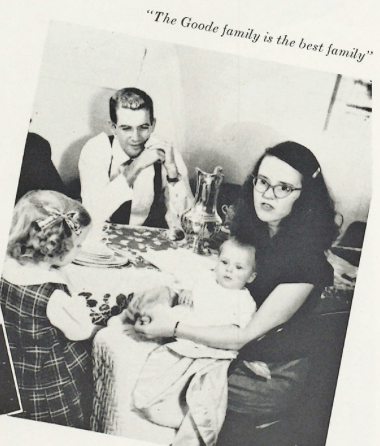
homemaking, as was expected of the time. Nancy’s transition from Carleton student to Pine Hill wife provides unique perspective for our study. She describes a busy lifestyle maintaining friendships on campus, working in the bookstore, adjusting to married life, settling into her new home, starting a family, and finding her place in the Pine Hill community.
The Hierarchy of Housing
“At first we called them metal huts and they were corrugated metal and they had two apartments in them with an entrance on each end, and then we had a child and we lived in nicer, bigger [homes], and they weren’t metal, they were like roofing materials — looked like brick but it wasn’t, and there were three of them in a row, fastened together…there was no basement, but then we had a space heater” [00:00:18]-[00:02:11]
“We had a kerosene stove that if I boiled something over on it this flame shot up to the ceiling” [00:00:18]-[00:02:11]
Financial Situations
“Everybody who was in the service could go to school on the GI Bill and it paid for my husband’s tuition and we got, I think he was getting like $70 a month while he was a student without being married and after we got married I think we got about $90 a month, and then we had a child and it could’ve gone up to $120.” [00:04:55]-[00:05:31]
Campus and Village Relationship
“I only went to school two years, so I had for two years after we were married I had friends in the dorm. Once in awhile, I’d stop by and see them, or they’d come to see me, and David was always out for track and his track guys would babysit for us once in awhile and just have a place to get away from the dorm. [00:03:04]-[00:03:53]
Marriage and College
“They would not have allowed me to take classes [after getting married]. My mother was so shocked that we were gonna get married after we’d known each other six months or something like that, and she said well they wouldn’t send me to school, and well it didn’t make any difference to me, but even if they’d been willing to send me to school the college wouldn’t have accepted me taking classes.” [00:07:00]-[00:07:23]
“After I got married I didn’t take classes at all. Until I became pregnant, I worked in the bookshop, in the bookstore, and worked there until it showed that I was pregnant and then I had to quit the job.” [00:05:48]-[00:06:12]
Community
Mrs. Goode: “I enjoyed living there. I enjoyed the contact with the college. All the other people that lived there were very congenial to know and one year we had a big Thanksgiving dinner in one of the, we used to call them huts, in one of the apartments, where we moved furniture out you know and set up tables and we all brought various things for the dinner and a lot of people were gone at Thanksgiving but the ones that were there we all got together and had a dinner together” [00:08:00]-[00:08:44]
Interviewer: “So it was like a little community, sort of family?” [00:08:46]-[00:08:48]
Mrs. Goode: “It was, it was” [00:08:49] -[00:08:51]
Listen to the interview audio here:
Robert (Bob) Will ’50
Robert came to Carleton in 1946 on the GI Bill, “fresh out of the Navy.” Although Robert never lived in Pine Hill himself, he had a lot of sharp insights about what life was like on the Hill. Robert graduated from Carleton in 1950, and later returned to campus as an Economics professor in 1957. Robert still resides in Northfield and plays an integral role in the Carleton community.
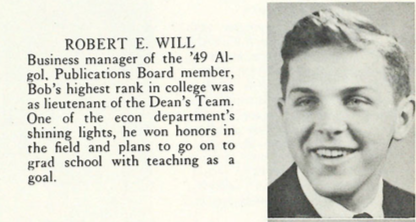
Robert Will in the 1950 Algol Yearbook
Carleton Marriage Culture:
“Pine Hill Village was confined mostly to married students, and in the years after the war obviously there had been a lot of men that had been out of civilian life for a number of years — two, three, five years. They were older I think; the oldest men on campus were 30 something at the time, and also in their time away, in the few years that they were gone, they really hadn’t connected with women in a significant way, so they were eager to get back and get married, and the social cultural ethos was that women should get married too, learn how to cook, have children, take care of the house, leftover from the ’30s, and that happily has changed.” [00:00:40]-[00:01:35]
“Men were eager to start life, have a family, and get married, and there were women eager to start life, have a family, and get married.” [00:01:42]-[00:01:51]
“I had a roommate here, my first year here, who had been in the army, I’d been in the Navy, but the summer after our freshman year Joe got married to Martha, his high school sweetheart, and they moved into Pine Hill. And so I could count on one good meal a week — she was a pretty good cook. And that was not an uncommon pattern, there were some who came here on their very first year they were on Pine Hill and already married, and some of those had been married before they went into service, and so there were a few children around too.” [00:28:48]-[00:29:40]
The Creation and Maintenance of Pine Hill Village:

“I think Pine Hill started during the war when Carleton played host to some different military programs. I think there was an air force program in meteorology and they had a number of students here who were soldiers in the air force at the time.” [00:02:45]-[00:03:05]
“So you had these hoop-like buildings [quonset huts], they’re for the soldiers in these programs and I think there was a Navy program here too. At any rate, they were up on the area we call Pine Hill now, and I don’t remember how many of them were there. There were also standard box-like buildings, two or three on campus, that weren’t quonset huts that were directly on the campus but those weren’t for residences… [In the huts there were] two apartments in each coming in from the ends, and it was usually a living room with a kitchen bath area and a bedroom. Some of them got kind of tight should children arise, which under the circumstances, wouldn’t be uncommon. The married students lived in them, and mostly, the married students, the men, were students, not as many women were students. Some of the men coming back had married their high school girlfriend, but the man got into Carleton the woman may not have even applied to Carleton, so there was a different culture amongst young people at the time. It wasn’t well landscaped. At that time, with the depression before the war, then the war, and then these buildings just sort of put up, there wasn’t too much, but there’d always be some couple, or one of the two, somewhere around, there’d be one quonset hut that’d just be lovely to see. All sorts of flowers around and bushes where somebody in that quonset hut had wanted to bring a little beauty into their lives.” [00:03:29]-[00:06:06]
Wives Residing in Pine Hill:
“For a while there, they tried, if I remember correctly, they tried to say that only one of you [the man] could be going to Carleton, and that seemed a little strange and I think that got changed.” [00:02:12]-[00:02:25]
“Many of the women did get jobs on campus in the years when they were discouraged from being students here, but the jobs were not created to provide a job to the women, it was just that they needed to have the job filled.” [00:22:51]-[00:23:12]
“[The women] were all young, they were comparing cooking, learning to cook, and they were comparing children’s illnesses and joys and preparation [for] teaching, training, and of course they were doing the laundry, they didn’t have laundry there, they were doing the shopping to get food for their family and doing the cooking. It was a busy life and they formed little, like a nursery school, where one or two of the mothers would mind the children of other families one week and the next week some other mothers would mind that same set of children so that the wife would be freed up from all of them having to work doing their own thing they’d have some free time, maybe to take some clothes down to the laundromat without having to worry about where their child was, or maybe to go to the grocery store.” [00:29:48] -[00:31:17]
Interviewer: “So most wives were homemakers? There were a few instances that we’ve come across of veterans that met their wives at Carleton, so their wives were Carleton students, and they were able to take classes, but it seems like the wives of veterans who were not Carleton students didn’t really take classes here.”
Robert: “Yeah, yeah I think that’s true. My memory of it, for example, Joe Logan who married Martha…I think her first year here and maybe more, she wasn’t a student, but I think either her third or the fourth year she did take courses.” [00:31:20]-[00:32:29]
“[The wives] tried to set up a common playground for their children [the children were generally too young to go to school].” [00:33:30]-[00:33:47]
“There was always a fuzzy problem with the married couples, for those who maybe the wife took courses, should she get aid, should she be simply let to take a course without any payment on her part, and so the complication of financial aid for married couples I think was one of the factors that led to not admitting married students anymore.” [00:40:12]-[00:40:41]
Cultural Divides between Pine Hill and Campus Residents:
“There was a kind of gap [between the people who were in service and those that weren’t], in terms of their cultural interest. Those of us who’d been in service felt we wanted to get through college, get on with our lives, and we wanted to really not play around. Then, we had, of course, a number of younger [students, probably 3 years younger or so than veterans] who were probably more interested in enjoying college life than getting through college. So there was that kind of cultural gap on campus. There was many of us, male veterans, lived in the dormitories too. We all weren’t married and living in Pine Hill. On the other hand, our friends, the clique that we would go around and hang with, tended to be our fellow veterans up on the Hill.” [00:06:30]-[00:07:41]
“The people on the Hill, the married couples, did not have to take meals in the dorms — that was more expensive…the most delightful evenings were those where one of us living in the dorms got invited up to have a meal with one of our friends up on the Hill.” [00:07:55]-[00:09:17]
“Another distinction, the veteran students really felt that they wanted to make a difference when they were back here, and they would try to, wherever in life they ended up, but as long as they were here, what could be done to improve or change things.” [00:11:30]-[00:11:58]
“I think there was some intermingling [between Carleton and Pine Hill residents] class linked, but I think social life wasn’t as much intermingling, or even mingling. Take Saturday night — up on the Hill, sure there might be a little party going on, or more likely one neighbor had another neighbor in, but for most of them, the male particularly had been off leading a varied life, some of it really very unpleasant, [so] he didn’t feel the need to be as active socially as the non-vet students did. So you found, on Saturday, there’d often be a dance in the old gym, and often with a student band playing…and some of the people on Pine Hill would come down as couples, some, not too many, they stayed home, they were glad to have a night at home, he had been studying hard, hadn’t been used to studying for three, four, five years, and felt the pressure to study more, it took probably took more time to do any given task, study task, then it might’ve if they had come fresh from high school and were used to doing studying. So there was this separation in social life, and again not complete, there were people on the Hill who would come down and go to the dance on Saturday night. And there were occasionally people from down who would go up to Pine Hill, be invited up, for some event, maybe tied to a course… There would be that, but it tended to be more separate. It would be unusual, minority case, of dormitory inhabitants heading up the Hill or people on the Hill coming down for Saturday events.” [00:18:36]-[00:22:44]
“That was a distinction between those on Pine Hill and those in the dorms, because the dorms sort of had the impetus, the pressure, that yes, you’re not on Pine Hill you’re here in the dorm, and people in dorms, they go to vespers, they go to chapel, and they go to Fridays convo, and the people on the Hill, I don’t think it was formally permitted that they needn’t attend chapel, but that’s the way it worked out.” [00:36:56]-[00:37:32]
Listen to the interview audio here:
Sue Lebeck Adamek ‘54

I was indeed in Northfield while there were still couples living in Pine Hill Village. Most had graduated and gone by my senior year. I had no contact with the Village and was not aware of who its residents were. I do not think any members of the Class of ’54 ever lived there, but student directories from that era should allow you to confirm that.
A number of men in my class went from Carleton graduation directly to military service though the Korean conflict was over by the time we finished. A number of others transferred out of Carleton to improve their chances of being deferred from the draft. Apparently one’s class rank helped determine deferment status, and a less selective college could provide a better chance of a high class rank. There were a few students who left for the fighting – the one I know of from ’54 was Bob Platt, English major, who enlisted. There were a few from earlier classes who left with the Minnesota National Guard when it was sent to Korea, among them John Rossberg of “53. I can’t speak for other classes.
I do know one of my classmates was married during our senior year, but he and his wife had an apartment over what was then Telander Drug, the Kasota stone building now owned by the College on Main Street.
Sorry I can’t be of help in your project.
Bill Phillips ’48
- Taken from 1948 Algol.
I would like to help your study but I have no recollection of Pine Hill Village. Sorry.
Ann Buran ’54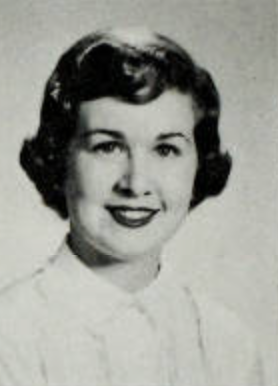
Never heard of Pine Hill Village (by that name at least. Is that where vets (a few married) were allowed to live?
Ken Wedding ’67
My dad was a student at Carleton from the fall of ’41 through December (Pearl Harbor and the beginning of WWII ended his Carleton career).
After WWII, Northfield was close and familiar enough that we had a couple family picnics here when I was very young. (early 1950s) Auto traffic was allowed on the road through the upper arb, and we took rides there. I might have heard of Pine Hill Village on one of those rides. I don’t remember that there was anything left of the village, but I was under 10 years old.
